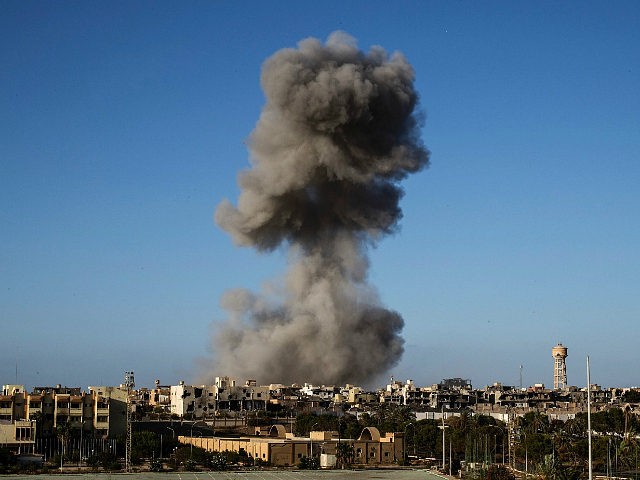The first publicly announced American airstrikes in Libya under U.S. President Donald Trump targeted a camp operated by the renascent Islamic State (ISIS/ISIL) branch in the country, killing 17 terrorists and destroying three vehicles, revealed the Pentagon Monday.
Citing Army Col. Rob Manning, a U.S. Department of Defense (DoD) spokesman, the Pentagon’s media arm DoD News notes:
U.S. forces, in coordination with Libya’s [United Nations-brokered] government of national accord and aligned forces, conducted six precision airstrikes in Libya against an Islamic State of Iraq and Syria desert camp Sept. 22.
U.S. Africa Command (AFRICOM), which oversees American military activities on the continent, recently estimated that nearly 500 ISIS terrorists remain “active in Libya now,” down from a peak of 4,000 to 6,000 in 2016.
The U.S. military has warned against an ongoing ISIS resurgence in the North African country, echoing Libyan troops.
On Friday, the U.S. airstrikes targeted an ISIS desert camp an estimated 150 miles southeast of Sirte, a city held by ISIS until U.S.-backed Libyan militias pushed the terrorist group out in December 2016.
The American military had once considered Sirte to be the largest ISIS stronghold outside of the group’s so-called caliphate in Iraq and Syria, which is currently shrinking, primarily at the hands of the American-led international coalition.
Referring to the encampment recently targeted by the U.S. airstrikes in Libya, Col. Manning indicated that “ISIS used the camp to move fighters in and out of the country, stockpile weapons and equipment and plot and conduct attacks.”
“ISIS and al-Qaida have taken advantage of ungoverned spaces in Libya to establish sanctuaries for plotting, inspiring and directing terror attacks,” he added.
Since the U.S.-backed overthrow and subsequent execution of Libyan dictator Moammar Gadhafi in 2011, the North African country has descended into chaos, becoming a jihadi breeding ground only a few hundred miles from the European coast.
Echoing Libyan troops, the United States has cautioned that ISIS is looking to use Libya as a launchpad for attacks in Europe and a resurgence after its defeat in the Middle East, believed to be imminent.
“These terrorists have sought safe haven and freedom of movement in Libya to launch external terror attacks in neighboring countries, and their operatives in Libya have also been connected to multiple attacks across Europe,” said officials from U.S. Africa Command (AFRICOM) in a statement.
Warning that ISIS was “regrouping” after its defeat in Sirte, Marine Gen. Thomas Waldhauser, the AFRICOM chief, told U.S. lawmakers in March that America had targeted the jihadist group with airstrikes in southern Libya on “January 18.”
The bombing, which marked the last known U.S. strikes on the North African country before Friday’s attack, reportedly took place “overnight” into January 19, former President Barack Obama’s last full day in office.
In April, President Trump proclaimed that he did “not see a role in Libya” for his administration beyond the U.S. fight against ISIS.
Following Friday’s U.S. airstrikes on the ISIS wing in Libya, Col. Manning declared:
The United States will track and hunt these terrorists, degrade their capabilities and disrupt their planning and operations by all appropriate, lawful and proportional means, including precision strikes against their forces, terror training camps, and lines of communications, [and] partnering with Libyan forces to deny safe havens for terrorists in Libya.
The U.S. supports its Libyan counterparts and stands by their efforts to combat terror threats and defeat ISIS in Libya, he also said, adding, “We are committed to maintaining pressure on the terror network and preventing them from establishing a safe haven.”

COMMENTS
Please let us know if you're having issues with commenting.